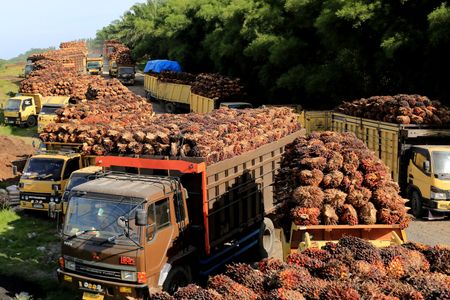 1
1 1
1

By Stefanno Sulaiman
JAKARTA (Reuters) – Indonesia Trade Minister Muhammad Lutfi said on Tuesday the government would bring down its combined maximum crude palm oil export and levy rate to $488 per tonne from $575 per tonne to encourage shipments.
Indonesia, the world’s biggest palm oil producer, has allowed palm oil exports to resume after a three-week ban, but progress has been slow due to red tape, keeping palm mills’ storage tanks full.
Farmers have complained that prices of palm fruits remain low because mills are still limiting their purchases.
The government would raise the maximum tax to $288 per tonne, but lower maximum levy to $200 per tonne, Lutfi said. Indonesia currently charges a maximum $200 per tonne for export tax and a maximum $375 per tonne for levy.
Lutfi did not specify when the new fees will be imposed.
The current total tax and levy charges are “burdensome”, said Trade Ministry senior official Oke Nurwan.
“Exports must flow, because storage tanks are full,” he told reporters.
Indonesia banned export of crude palm oil and some of its derivatives from April 28 for three weeks in efforts to control soaring domestic prices of cooking oil, made from palm oil.
To ensure secure domestic supply of palm oil after the ban was lifted, the government has put in place a policy stating producers must sell a portion of their products to the local market before they are granted export permits.
Industry groups have requested that the government allow a bigger exports quota during the transition period to free up storage after a number of palm oil mills stopped buying palm fruits from farmers.
Asked about the request, Lutfi said “we are reviewing” the proposal. He said companies are allowed to export five times the amount they have sold locally.
(Reporting by Stefanno Sulaiman; Writing by Fransiska Nangoy; Editing by Kanupriya Kapoor)